|
|
|
Sort Order |
|
|
|
Items / Page
|
|
|
|
|
|
|
| Srl | Item |
| 1 |
ID:
100678
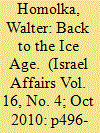

|
|
|
|
|
| Publication |
2010.
|
| Summary/Abstract |
Until well into the twentieth century, Jews and Christians had no mutual basis for discourse. The Christian-Jewish dialogue and the rapprochement between the Holy See and the State of Israel are owed in essence to feelings of shame regarding the Shoah. The Second Vatican Council and the pontificate of John Paul II signified substantial breakthroughs. Since then, though, the sense of guilt has eased, and the Roman Catholic Church's awareness of the injustice of its role as fellow traveller to, and henchman of, the Third Reich has diminished. Under the current Pope, Benedict XVI, the relationship between Jews and Catholics has noticeably deteriorated. After five years of his pontificate, Joseph Ratzinger has lost a great deal of trust, and not only among Jews.
|
|
|
|
|
|
|
|
|
|
|
|
|
|
|
|
| 2 |
ID:
168983
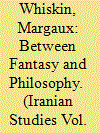

|
|
|
|
|
| Summary/Abstract |
Zadig ou la Destinée opens on a preface supposedly written by Sadi (sic), who seems to suggest he is the translator of the story which is to follow. The article will investigate the role played by Voltaire’s reference to Saʿdi in Zadig as an Oriental prop for the narrative’s exotic setting, but also, more importantly, as participating in its philosophical content. Travelers’ accounts had brought growing interest in Persia, and Saʿdi would not have been unfamiliar to an educated public; the Orient more generally became an experimental space for Enlightenment thought. Playing on the notion of the translator as cultural bridge, the article examines the uses Voltaire makes of Saʿdi in Zadig and whether these correlate to the eighteenth-century French reader’s perceptions of the Iranian poet.
|
|
|
|
|
|
|
|
|
|
|
|
|
|
|
|
| 3 |
ID:
072481
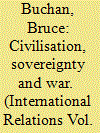

|
|
|
|
|
| Publication |
2006.
|
| Summary/Abstract |
In recent international relations (IR) literature and foreign policy, the concept of civilisation has enjoyed a surprising revival. Its recent use, however, has had little reference to those who did most to introduce it into modern thought, the thinkers of the Scottish Enlightenment. A re-examination of their thought suggests the need for a more nuanced view of civilisation, one that appreciates that the promise of domestic peace that comes with civilisation is also laden with the peril of war and new dynamics of international order. This article will focus on how David Hume (1711-76), William Robertson (1721-93), Adam Smith (1723-90) and Adam Ferguson (1723-1816) framed their understanding of civilisation and the civilising process in Europe. It will be argued that they were animated by the need to identify the processes at work in reshaping Europe, giving rise to a new international order of civilised societies and mighty sovereign states. Civilisation thus emerged as a process not simply of domestic refinement and pacification, but of the emergence of a new kind of international order between militarily powerful, 'civilised' and 'civilising' sovereign states with enhanced capacities for waging war.
|
|
|
|
|
|
|
|
|
|
|
|
|
|
|
|
| 4 |
ID:
108019
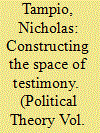

|
|
|
|
|
| Publication |
2011.
|
| Summary/Abstract |
How do we conceptualize distinctions between religious-political territories in the contemporary world when old categories-such as Islam and the West, or dar al-Islam and dar al-harb-precipitate misunderstandings and conflicts? In this essay, I consider Tariq Ramadan's argument that Muslims must enact an intellectual transformation along the lines of Kant's Copernican revolution and thence create concepts-such as the space of testimony (dar al-shahada)-to facilitate interreligious dialogue, cooperation, and respectful contestation. The essay aims to illuminate the nature of Ramadan's political theory and dispel the claim that he is a Muslim Martin Luther; to imagine the contours of a future political-intellectual movement that integrates elements of the European Enlightenment and the Arab Nahda; and to envision how Muslim and non-Muslim political theorists may combat political Manichaeanism without denying the reality and importance of contending ethical visions and political identities.
|
|
|
|
|
|
|
|
|
|
|
|
|
|
|
|
| 5 |
ID:
153015
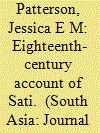

|
|
|
|
|
| Summary/Abstract |
Writing in the period 1765–79, John Zephaniah Holwell, temporary governor of Bengal, was one of the first British writers to attempt a scholarly engagement with Hinduism. Despite being an important source for several Enlightenment writers, his work has been misrepresented by current scholarship. In particular, his account of ‘voluntary sacrifice’, or sati, has been misunderstood as an example of eighteenth-century rationalism. This article will correct this by situating the account in a much fuller appreciation of Holwell's ‘project’, which can be broadly understood as an attempt to reconcile his own heterodox Christianity with what he termed ‘Gentoo’ doctrines. It will show how Holwell's insistence on the essential truth of ‘metempsychosis’ reveals an account of sati that is far more invested in presenting a particular reading of Indian religious principles than has hitherto been appreciated. This analysis challenges certain assumptions in the historiography of eighteenth-century European encounters with India, with a particular emphasis on intellectual culture.
|
|
|
|
|
|
|
|
|
|
|
|
|
|
|
|
| 6 |
ID:
029400
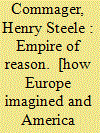

|
|
|
|
|
| Publication |
New York, Anchor Press., 1977.
|
| Description |
xiv, 342p.hbk
|
| Standard Number |
0385116721
|
|
|
|
|
|
|
|
|
|
|
|
Copies: C:1/I:0,R:0,Q:0
Circulation
| Accession# | Call# | Current Location | Status | Policy | Location |
| 017462 | 973.2/COM 017462 | Main | On Shelf | General | |
|
|
|
|
| 7 |
ID:
083855
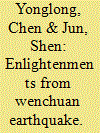

|
|
|
| 8 |
ID:
147715
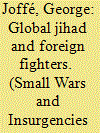

|
|
|
|
|
| Summary/Abstract |
One question that has been unresolved since the current phase of extremism began in the early- to mid-1990s has been whether or not there is a global structure to the jihadi phenomenon. This paper argues that no such definable structure exists, although regional, national, and local networks may well share common objectives and ideological ambitions. There has, in short, been a process of global branding that has developed that, in structural terms, corresponds to a ‘network of networks’. These objectives and the related praxis, moreover, have evolved over the years, going through three distinct stages of development, encapsulated in the strategic distinctions between al-Qa’ida, Ansar al-Shar’ia, and the Islamic State (Da’ish). Allied to this is a second consideration; namely that the formal ideological inspiration and justification for extremist activities is a set of integrated common insights that form a coherent ideology derived from a literalist interpretation of Islam, Salafism. A further aspect of the Salafi–jihadi phenomenon is to what degree this formal ideology is the real explanation of the appeal of these movements to their adherents, particularly to the so-called ‘foreign fighters’ – those who volunteer from countries not directly implicated in the specific conflicts in which they participate. This paper will argue that the phenomenon is far more complex than the superficial appeal of jihadist ideology would suggest. Finally, the paper will attempt to sketch out what the underlying causes of the intense wave of extremism sweeping the Middle East and North Africa might be and to what extent ‘blow-back’ from returning jihadis should be of concern to home governments.
|
|
|
|
|
|
|
|
|
|
|
|
|
|
|
|
| 9 |
ID:
151201
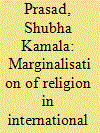

|
|
|
|
|
| Summary/Abstract |
This article aims to address why religion has been marginalised in international relations (IR) and discusses its implications. The first section examines the literature on the secular roots of the discipline of IR and how theoretical inputs from the West are shaped by context-specific European events and philosophies that are not ‘universal’ in nature. The second part delves into how the existing theoretical traditions of IR—realism, liberalism and constructivism—can incorporate religion as a variable in evaluating international politics. The final section will explore the problems with the recent spate of literature from the West after 9/11 on religion and IR. The article contends that the Indian conception of secularism, which has been studied in-depth vis-à -vis Indian domestic politics but not international politics, can be further examined to formulate frameworks that understand and deal with religion in IR.
|
|
|
|
|
|
|
|
|
|
|
|
|
|
|
|
| 10 |
ID:
040444
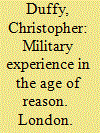

|
|
|
|
|
| Publication |
London, Routledge & Kegan Paul, 1987.
|
| Description |
xi, 283p.
|
| Standard Number |
0710210248
|
|
|
|
|
|
|
|
|
|
|
|
Copies: C:1/I:0,R:0,Q:0
Circulation
| Accession# | Call# | Current Location | Status | Policy | Location |
| 029004 | 355/DUF 029004 | Main | On Shelf | General | |
|
|
|
|
| 11 |
ID:
100761
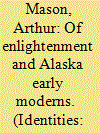

|
|
|
|
|
| Publication |
2010.
|
| Summary/Abstract |
This article examines transformations of status-capital in the modern history of the Alaska Native Alutiiq. I redevelop Pierre Bourdieu's forms of capital and habitus to analyze how Alutiiq elites stay on course during massive changes in their social structure. By drawing attention to citizenship statuses of the nineteenth century Russian and American colonial periods, I explore how local structural inequalities emerge in Alaska, yet with leaders of the same Alaska Native kin groups moving into the new privileged positions as Russian Imperial citizen, then later as American citizen. The study identifies citizenship as a key technology of group identification in Alaska and, in particular, how civilizing processes associated with citizenship create marked objective differences among the Alutiiq. Alaska Native society's articulation with the Russian and, later, American cultural-political orders creates new kinds of local structural inequalities. By possessing the requisite cultural capital to comprehend structural shifts in politics and the economy, Alaska Native elites strategically fit into new legal and ideological regimes of belonging. What develops is an example of the durability of an Alaska Native ruling elite by means of the transformation of prestige.
|
|
|
|
|
|
|
|
|
|
|
|
|
|
|
|
| 12 |
ID:
120364
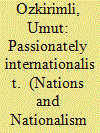

|
|
|
|
|
| Publication |
2013.
|
| Summary/Abstract |
The aim of this academic obituary is to briefly consider Fred Halliday's (1946-2010) contribution to nationalism studies. The article will first discuss Halliday's understanding of nationalism, which he defines as a set of ideas that asserts that the world is divided into distinct peoples with a particular history and various entitlements, and his position in the theoretical debate on nationalism. It will then focus on Halliday's combat with the ethical doctrine of nationalism, more specifically the tension between the moral claims of the latter and what he loosely terms Enlightenment principles. The article will conclude by a brief discussion of Halliday's political commitments and his internationalism.
|
|
|
|
|
|
|
|
|
|
|
|
|
|
|
|
| 13 |
ID:
069787
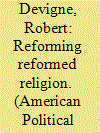

|
|
|
| 14 |
ID:
085901
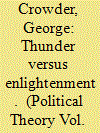

|
|
|
|
|
| Publication |
2009.
|
| Summary/Abstract |
I thank David Thunder for his stimulating comments.I agree with
him that the issues debated here are important for public policy, but I don't accept that he has presented anjy good reason to reject my case for Enlightenment or autonomy-based liberalism, Thunder makes two main claims:first, that a meaningful right of exit needn't commit us to individual autonomy in the strong Enlightenment sense;second, that value pluralism doesn't generate such a commitment either.
|
|
|
|
|
|
|
|
|
|
|
|
|
|
|
|
| 15 |
ID:
140809
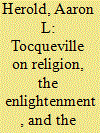

|
|
|
|
|
| Summary/Abstract |
This article proposes a new interpretation of Tocqueville's thought, one that focuses on his account of religious psychology. From his observations of America, Tocqueville concludes that human beings have a natural hope for immortality—a hope that is driven by a paradoxical but ineradicable desire to affirm and forget oneself simultaneously. Tocqueville formulates this insight as a critique of the Enlightenment thinkers who laid the foundations for liberal democracy; I argue that he crafts his “new political science” to provide healthy outlets for the religious hopes whose existence these thinkers largely denied and whose anomalous presence in the United States has accordingly led to unforeseen dangers. Tocqueville's analysis not only helps us understand and begin to remedy those dissatisfactions that characterize democracy today but it also reveals his theoretical depth, political moderation, and sober assessment of our moral psychology in a way not seen before.
|
|
|
|
|
|
|
|
|
|
|
|
|
|
|
|
| 16 |
ID:
164324
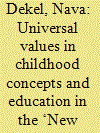

|
|
|
|
|
| Summary/Abstract |
The tension between universal and local values is reflected in educational discourse in every period and society. The education of children serves to strengthen national identity and local culture in the face of globalising trends. This article examines the position and influence of western childhood images and pedagogical concepts, developed mainly from the eighteenth century onward, on the concepts and attitudes of educators of the Jewish national revival in the Land of Israel at the beginning of the twentieth century. Its focus is on the period in which the Hebrew educational system was founded, and children were valued as the future generation that would materialise the adults’ national hopes.
|
|
|
|
|
|
|
|
|
|
|
|
|
|
|
|
| 17 |
ID:
087439
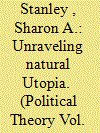

|
|
|
|
|
| Publication |
2009.
|
| Summary/Abstract |
Diderot's Supplement to the Voyage of Bougainville has often been read as a Rousseauian condemnation of modern civilization judged against the standard of pure Nature. A cursory reading of the Supplement does appear to present Tahiti as a natural utopia and Europe as a civilized prison. This essay rejects such a reading by demonstrating that the Supplement actually undermines any clear opposition between virtuous nature, represented by Tahiti, and corrupt civilization, represented by Europe. Although Diderot truly does offer a stinging critique of modern Europe, he refuses to offer "nature" as a redemptive alternative. Instead, the Supplement offers an implicit critique of the politics of moralism.
|
|
|
|
|
|
|
|
|
|
|
|
|
|
|
|
|
|
|
|
|